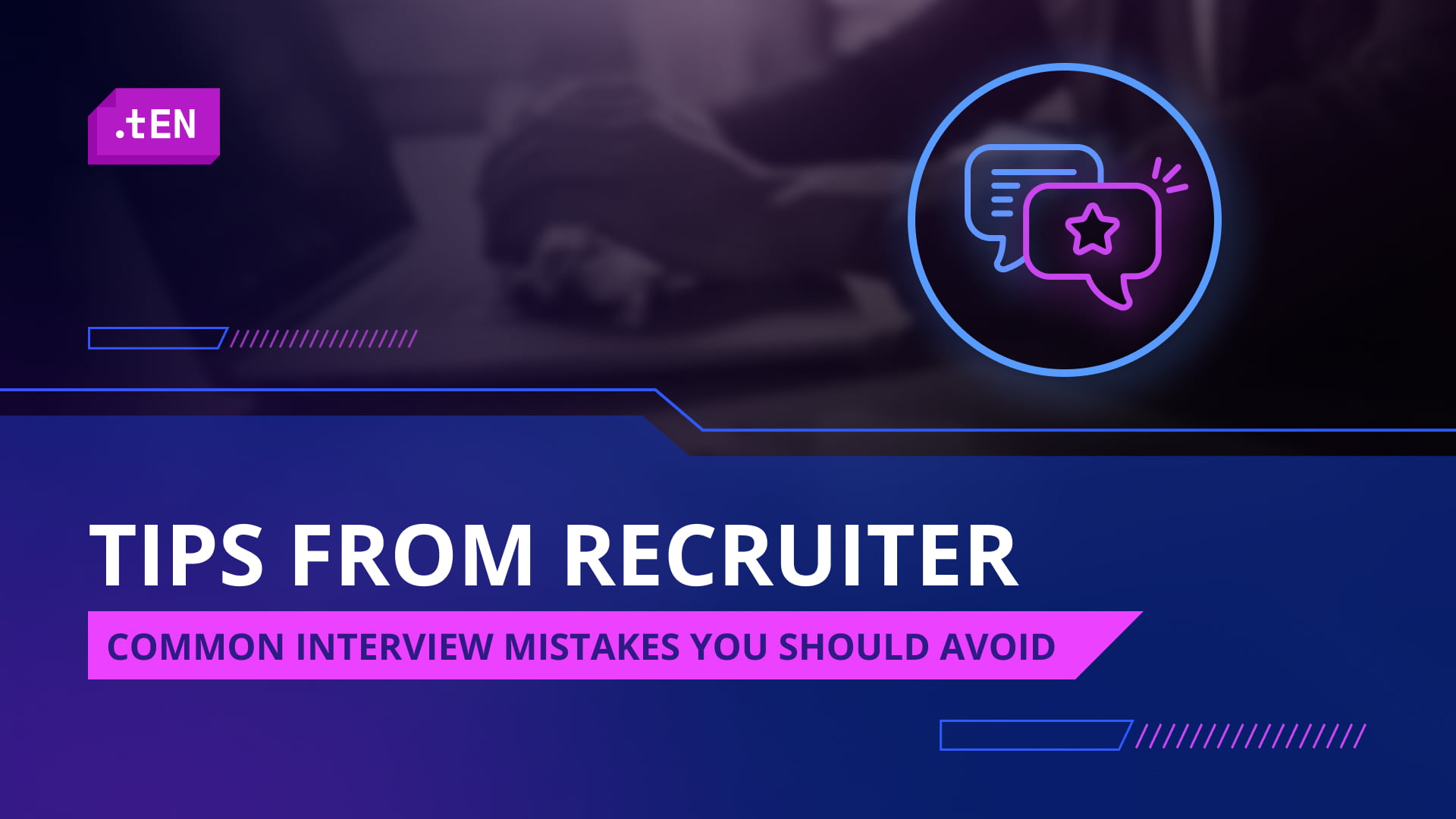TEN blogs
Preparation guidelines for your next interview


The decision to hire a specialist predominantly falls into the hands of the team lead, tech lead, or management of a prospective company. However, the initial interview is typically conducted with a recruiter or HR manager. Their role is to evaluate the compatibility between the company and the candidate before deciding whether to extend an invitation for a subsequent interview. This article delves into the common mistakes frequently encountered during these interviews.
1. Lack of preparation for the interview
This term doesn’t refer to your professional expertise but instead relates to gathering information about the company for your own insights. This process helps you gauge the company’s appeal, understand its operations, and identify the markets it caters to, among other things. Preparation demonstrates to the recruiter your interest in the role. Keep in mind, though, that the recruiter will provide a company overview during the initial interview and furnish detailed information. The most unfavourable circumstance is when candidates claim not to recall the company or insist they applied due to a friend’s suggestion.
2. Criticizing the recruiter
Just like any other profession, recruiters are humans and are susceptible to making mistakes or having off days. There may be occasions when we lack certain information, but rest assured, we always strive to gather comprehensive knowledge. If we are unable to provide an answer, we can arrange to research and return with a response.
3. Avoiding direct answers
It is crucial to provide direct answers to the questions asked. For example, when asked about your professional experience, sharing unrelated childhood anecdotes does not provide relevant or useful information about your suitability for the role.
4. Not posing any questions
While you don’t need to bombard the interviewer with numerous queries, it is peculiar if you don’t ask even basic questions about salary or benefits. Remember, it is entirely appropriate and necessary to discuss financial compensation, despite outdated advice suggesting otherwise.
5. Dishevelled appearance
Maintaining a neat appearance is still important, even if it may seem a bit old-fashioned. While a suit may not be mandatory, wearing attire appropriate for the occasion is expected. A clean T-shirt and tidy hair should be sufficient.
6. Respecting each other’s time
This point resonates particularly strongly with recruiters. If you foresee an inability to attend the interview, kindly inform the counterparty in advance. There’s no need to wait until the last moment or worse, fail to show up entirely. Let’s extend mutual respect for each other’s time.
7. Negativity about past workplaces
This doesn’t imply you can’t express reasons for leaving a previous company. However, it’s critical to refrain from spreading gossip or negativity.
8. Disclosing your life history
The interview should focus on relevant aspects of your life and experience, not your entire life story.
9. Dishonesty
If you’re uncertain about an answer, it’s far better to admit that you don’t know or can’t recall the information than to deceive. Your technical knowledge will inevitably be assessed during a technical interview. Some candidates may believe they can initially mislead the recruiter and use the time before the technical meeting to catch up. Unfortunately, this strategy often fails. The technical lead or manager conducting the interview determines the specific questions, which can cover a wide range of topics. It’s impossible to quickly skim through and fully comprehend material or gain extensive experience within a few days, which others might have acquired over 10-15 years. Let’s agree that a bitter truth is more palatable than a sweet lie.
10. Inconsistencies in your resume
This point is self-explanatory. Embellishing your resume is never a good idea. Always depict your experience and skills as they truly are.
Conclusion
Keep in mind that an interview usually lasts for 20-40 minutes. Your primary aim should be to immerse the recruiter in your relevant experience. Avoid sharing information that bears no relation to the role for which you are being interviewed. However, if the recruiter asks about your hobbies or personal life, feel free to provide a brief response.
The guidelines provided in this article are brought to you by Oleksandra Semeniuk, a professional recruiter with years of successful experience in placing candidates in various IT and game development roles.
We hope this outline proves beneficial to you.
Best of luck with your future interviews!
—
Remember to follow us on Twitter to stay updated with the latest news and curated job postings. Also, make sure to visit our job section where you’ll find more than 7,000 open roles in the gaming industry.